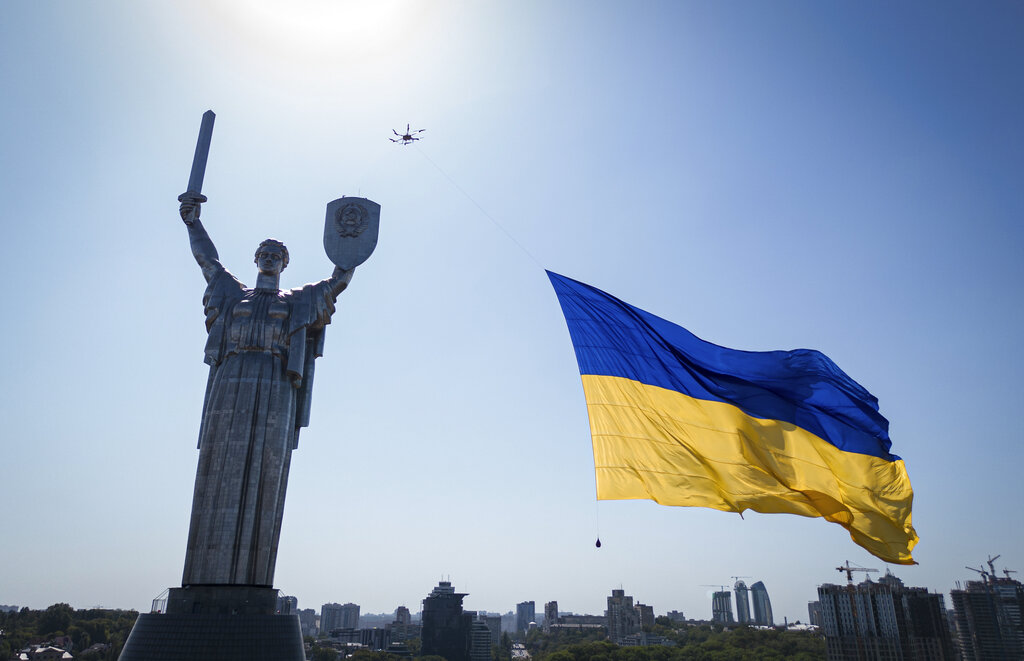Death toll in train station attack in Ukraine rises to 25
CHAPLYNE, Ukraine (AP) — The death toll from a Russian rocket attack on a train station and the surrounding area on Ukraine’s Independence Day climbed to 25, including at least two children, Ukrainian authorities said Thursday. Russia said it targeted a military train and claimed to have killed more than 200 Ukrainian reservists.
The bloodshed came as Ukraine was braced for attacks tied to the national holiday and war’s six-month mark, both of which fell on Wednesday. President Volodymyr Zelenskyy had warned that Russia might “try to do something particularly nasty, something particularly cruel” this week.
Meanwhile, Russian President Vladimir Putin ordered an increase in the country’s armed forces of 137,000 troops, or more than 13%, by Jan. 1. That would bring Russia’s troop strength to over 1.15 million.
The move appeared to be an effort to replenish forces that have sustained heavy losses in the Ukraine war.
The decree Putin signed did not say whether the increase would be accomplished by expanding the draft, recruiting more volunteers, or both.
Western estimates of Russian dead have ranged from more than 15,000 to over 20,000 — more than the Soviet Union lost during its 10-year war in Afghanistan. The Pentagon said last week that as many as 80,000 Russian troops have been killed or wounded, eroding Moscow’s capability to conduct big offensives.
The lethal train-station strike in Chaplyne, a town of about 3,500 in the central Dnipropetrovsk region, served as a painful reminder of Russia’s continued ability to inflict large-scale suffering six months into the war. Wednesday’s national holiday celebrated Ukraine’s 1991 declaration of independence from the Soviet Union.
The dead included an 11-year-old boy found under the rubble of a house and a 6-year-old killed in a car fire near the train station, authorities said.
The deputy head of the Ukrainian presidential office, Kyrylo Tymoshenko, did not say whether all of the 25 people killed were civilians. If they were, it would amount to one of the deadliest attacks on civilians in weeks. Thirty-one people were reported wounded.
In his nightly video address Wednesday, Zelenskky detailed the attack and vowed: “We will definitely make the occupiers bear responsibility for everything they have done. And we will certainly drive the invaders out of our land. Not a single stain of this evil will remain in our free Ukraine.”
Russia’s Defense Ministry said its forces used an Iskander missile to strike a military train carrying Ukrainian troops and equipment to the front line in eastern Ukraine. The ministry claimed more than 200 reservists “were destroyed on their way to the combat zone.”
Tetyana Kvitnytska, deputy head of the Dnipropetrovsk regional health department, said those hurt in the train station attack suffered head injuries, broken limbs, burns and shrapnel wounds.
“People were in a difficult condition, both physically and psychologically,” she said.
Following attacks in which civilians have died, the Russian government has repeatedly claimed that its forces aim only at legitimate military targets. Hours before the train station attack, Russian Defense Minister Sergei Shoigu insisted the military was doing its best to spare civilians, even at the cost of slowing down its offensive in Ukraine.
Trains and other infrastructure have been frequent Russian targets, with the Kremlin citing their role in transporting military supplies and troops. Trains are also critical for transporting fleeing civilians and humanitarian aid.
In April, a Russian missile attack on a train station in the eastern Ukrainian city of Kramatorsk killed more than 50 people as crowds of mostly women and children sought to flee the fighting. The attack was denounced as a war crime.
In Geneva, the U.N.’s human rights chief, Michelle Bachelet, decried the six months since the Russian invasion as “unimaginably horrifying.”
In Moscow on Thursday, Dmitry Medvedev, the secretary of Russia’s Security Council, said Western hopes for a Ukrainian victory are futile and emphasized that the Kremlin will press home what it calls the “special military operation,” leaving just two possible outcomes.
“One is reaching all goals of the special military operation and Kyiv’s recognition of this outcome,” Medvedev said on his messaging app channel. “The second is a military coup in Ukraine followed by the recognition of results of the special operation.”
